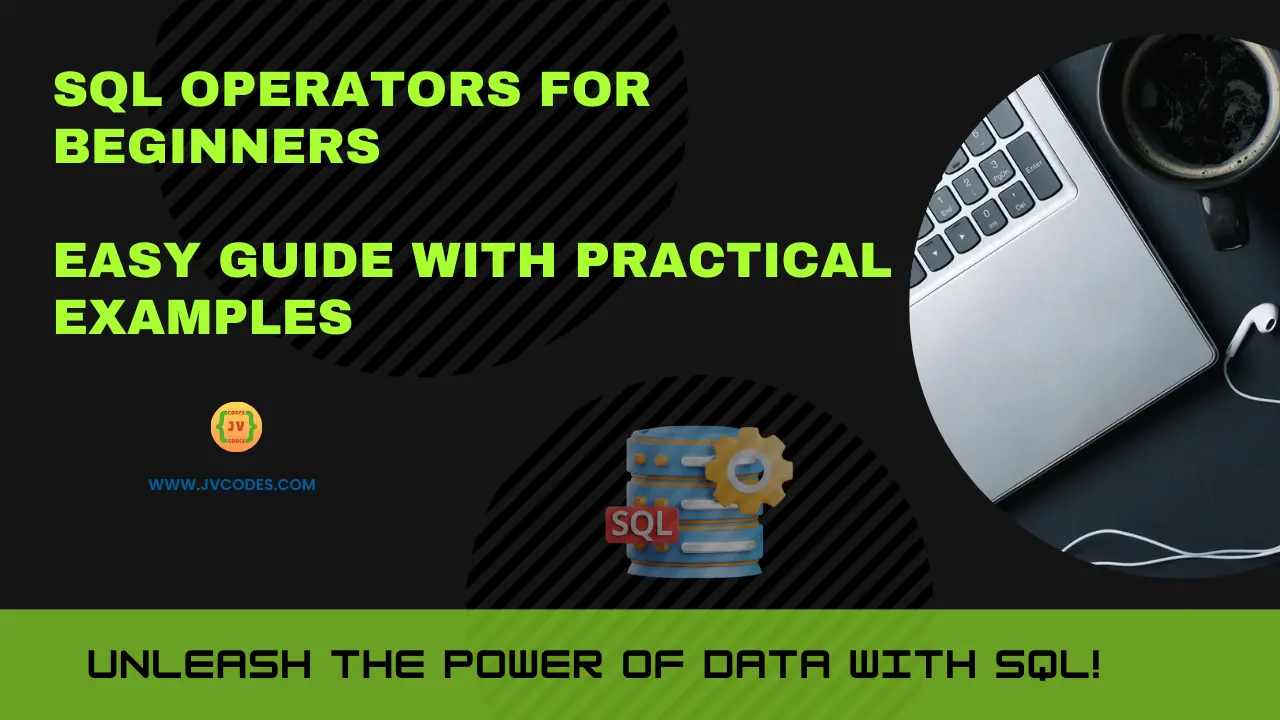SQL Operators for Beginners: Easy Guide with Practical Examples
Are you having trouble writing SQL queries? Let’s simplify it! The guide offers simple explanations about SQL operators with basic illustrative examples for entry-level students. You should view operators as valuable when calculating numbers, combining conditions, or using filters.
This post, SQL Operators for Beginners: Easy Guide with Practical Examples, will explain all the main types of SQL operators with simple words and clear examples.
Let’s dive in!
What Are SQL Operators?
SQL database operators serve as symbols and keywords that execute mathematical, comparison, or logical tasks for your database operations. Operators function as tools that enable data additions and comparisons or the implementation of filters. Operational data management becomes impossible without operators.
For example, to find employees in the USA, you’d use operators like = or AND. Simple, right? Let’s explore how they work.
Types of SQL Operators
Here are the common types of SQL Operators:
- Arithmetic Operators in SQL
- SQL Comparison Operators
- Logical Operators
- Bitwise Operators
- Compound Operators
- Special Operators
Each type has its use. Let’s look at them one by one.
Arithmetic Operators in SQL
We use these to perform simple math operations.
| Operator | Description |
|---|---|
| + | Adds two values |
| – | Subtracts the second from the first |
| * | Multiplies values |
| / | Divides values |
| % | Finds remainder (modulus) |
Example:
SELECT price, price - 10 AS "Discounted Price" FROM products;
This subtracts 10 from every product price.
SQL Comparison Operators
These help you compare values in a query.
| Operator | Meaning |
|---|---|
| = | Equal to |
| > | More than |
| < | Less than |
| >= | More or equal |
| <= | Less or equal |
| <> | Not equal |
Example:
SELECT * FROM books WHERE pages > 300;
This shows all books with more than 300 pages.
Logical Operators Examples
Logical operators combine multiple conditions.
| Operator | What It Does |
|---|---|
| AND | Both conditions must be true |
| OR | At least one condition must be true |
| NOT | Reverses the condition |
Example:
SELECT * FROM students WHERE grade = 'A' OR grade = 'B';
This finds students with grades A or B.
Logical operator examples are used often in filter-based queries.
SQL Bitwise Operators
These operators work on bits (0s and 1s). Used in special tasks.
| Operator | Meaning |
|---|---|
| & | Bitwise AND |
| ^ | Bitwise XOR |
| ~ | Bitwise NOT |
| << | Shift left |
| >> | Shift right |
You may not need these as a beginner, but they are part of SQL.
Compound Operators in SQL
These update and assign values at the same time.
| Operator | What It Does |
|---|---|
| += | Add and update |
| -= | Subtract and update |
| *= | Multiply and update |
| /= | Divide and update |
| %= | Modulus and update |
| &= | Bitwise AND and update |
| ^= | Bitwise XOR and update |
Often used in procedures or stored queries.
Special SQL Operators
These are very handy when you want to check multiple values or ranges.
| Operator | Use for |
|---|---|
| ALL | Compare with all values |
| ANY | Compare with any value |
| BETWEEN | Check if value is in the list |
| IN | True if the subquery returns data |
| EXISTS | True if subquery returns data |
| SOME | Same as ANY |
| UNIQUE | Check if rows are unique |
Example:
SELECT * FROM customers WHERE city IN ('New York', 'Los Angeles', 'Dallas');
This shows customers from these three cities only.
Tips for Beginners
- Always start small
- Use sample data tables
- Try each operator one by one
- Check your results
- Stay patient and keep trying
Common Mistakes to Avoid
- Mixing Data Types: Don’t add numbers to text (e.g.,
'apple' + 3). - Forgetting Parentheses: Use
()to control math order. - Ignoring NULL: Use
IS NULL, not= NULL.
FAQs for SQL Operators for Beginners
Q: What’s the difference between AND and OR?
A: AND needs both conditions true. OR needs at least one.
Q: Can I use + for text?
A: Only in some SQL tools (like concatenation). Stick to numbers for safety.
Final Thoughts
Now you’ve learned about the most used SQL Operators with clear examples. Try them yourself and see how helpful they are in actual data queries.
Knowing these operators is key, whether using SQL for Beginners or moving toward advanced topics.
Practice these examples, avoid common mistakes, and you’ll filter, calculate, and update data like a pro. Remember, operators are your friends—use them well!
Recommended for You
- What Are SQL Constraints? Definitions, Uses, and Practical Examples
- What is SQL? How to Write Clean and Correct SQL Commands for Beginners
- Learning SQL (Generate, Manipulate, Retrieve Data) – Alan Beaulieu
- Practical SQL (2nd Edition) – Anthony DeBarros
- Python Programming and SQL Bible – 7 Books in 1 – Oles Aleksey







